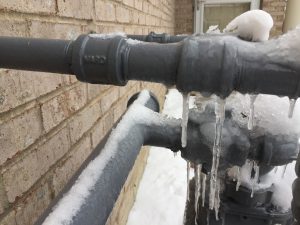Essential Advice for Preventing Frozen Plumbing in Winter Seasons
Essential Advice for Preventing Frozen Plumbing in Winter Seasons
Blog Article
We have come across this article involving How to prepare your home plumbing for winter weather listed below on the net and reckoned it made good sense to write about it with you here.

Cold weather can damage your pipes, especially by freezing pipelines. Below's just how to prevent it from occurring and what to do if it does.
Introduction
As temperatures drop, the threat of frozen pipes rises, possibly causing costly fixings and water damages. Comprehending how to stop icy pipes is critical for property owners in chilly climates.
Avoidance Tips
Insulating vulnerable pipes
Cover pipes in insulation sleeves or make use of warmth tape to safeguard them from freezing temperatures. Focus on pipelines in unheated or outside locations of the home.
Home heating techniques
Maintain indoor areas sufficiently heated, specifically areas with plumbing. Open closet doors to enable cozy air to flow around pipelines under sinks.
Exactly how to determine icy pipelines
Seek reduced water flow from faucets, unusual smells or noises from pipes, and visible frost on exposed pipes.
Long-Term Solutions
Architectural adjustments
Consider rerouting pipes away from outside wall surfaces or unheated locations. Add extra insulation to attics, cellars, and crawl spaces.
Updating insulation
Purchase top notch insulation for pipelines, attic rooms, and wall surfaces. Appropriate insulation assists keep consistent temperatures and minimizes the danger of frozen pipes.
Safeguarding Outside Plumbing
Garden hose pipes and outside taps
Separate and drain garden hoses prior to wintertime. Install frost-proof faucets or cover outdoor taps with protected caps.
Comprehending Frozen Pipes
What causes pipelines to freeze?
Pipes freeze when exposed to temperatures listed below 32 ° F (0 ° C) for prolonged durations. As water inside the pipelines freezes, it expands, taxing the pipeline wall surfaces and possibly creating them to break.
Dangers and problems
Icy pipes can cause water system disruptions, home damage, and pricey fixings. Burst pipelines can flood homes and create extensive structural damages.
Indicators of Frozen Piping
Determining frozen pipes early can stop them from breaking.
What to Do If Your Pipelines Freeze
Immediate actions to take
If you believe frozen pipes, maintain taps available to soothe stress as the ice thaws. Utilize a hairdryer or towels soaked in warm water to thaw pipes gradually.
Final thought
Avoiding icy pipelines requires positive actions and quick reactions. By comprehending the causes, indicators, and safety nets, house owners can protect their pipes throughout winter.
Helpful Tips to Prevent Frozen Pipes this Winter
UNDERSTANDING THE BASICS: WHY PIPES FREEZE AND WHY IT’S A PROBLEM
Water freezing inside pipes is common during the winter months, but understanding why pipes freeze, and the potential problems it can cause is crucial in preventing such incidents. This section will delve into the basics of why pipes freeze and the associated problems that may arise.
THE SCIENCE BEHIND FROZEN PIPES
When water reaches freezing temperatures, it undergoes a physical transformation and solidifies into ice. This expansion of water as it freezes is the primary reason pipes can burst. As the water inside the pipe freezes, it expands, creating immense pressure on the walls. If the pressure becomes too great, the pipe can crack or rupture, leading to leaks and water damage.
FACTORS THAT CONTRIBUTE TO PIPE FREEZING
Low Temperatures: Extremely cold weather, especially below freezing, increases the risk of pipes freezing. Uninsulated or Poorly Insulated Pipes: Pipes located in unheated areas, such as basements, crawl spaces, or attics, are more prone to freezing. Insufficient insulation or lack of insulation altogether exacerbates the problem. Exterior Wall Exposure: Pipes running along exterior walls are susceptible to freezing as they encounter colder temperatures outside. Lack of Heating or Temperature Regulation: Inadequate heating or inconsistent temperature control in your home can contribute to frozen pipes. PROBLEMS CAUSED BY FROZEN PIPES
- Pipe Bursting: As mentioned earlier, the expansion of water as it freezes can cause pipes to burst, resulting in significant water damage.
- Water Damage: When pipes burst, it can lead to flooding and water damage to your property, including walls, ceilings, flooring, and personal belongings.
- Structural Damage: Prolonged exposure to water from burst pipes can compromise the structural integrity of your home, leading to costly repairs.
- Mold and Mildew Growth: Excess moisture from water damage can create a favorable environment for mold and mildew growth, posing health risks to occupants.
- Disrupted Water Supply: Frozen pipes can also result in a complete or partial loss of water supply until the issue is resolved.
WHY CERTAIN PIPES ARE MORE PRONE TO FREEZING
- Location: Pipes located in unheated or poorly insulated areas, such as basements, crawl spaces, attics, or exterior walls, are at higher risk of freezing.
- Exterior Pipes: Outdoor pipes, such as those used for irrigation or exposed plumbing, are particularly vulnerable to freezing as they are directly exposed to the elements.
- Supply Lines: Pipes that carry water from the main water supply into your home, including the main water line, are critical to protect as freezing in these lines can affect your entire plumbing system.
- Underground Pipes: Pipes buried underground, such as those connected to sprinkler systems or outdoor faucets, can be susceptible to freezing if not properly insulated.
https://busybusy.com/blog/helpful-tips-to-prevent-frozen-pipes-this-winter/

I recently found that piece of writing about 6 Ways to Prevent Frozen Pipes when surfing around the web. Sharing is caring. You won't know, you might be doing someone a favor. Thanks for being here. Come back soon.
Call Today Report this page